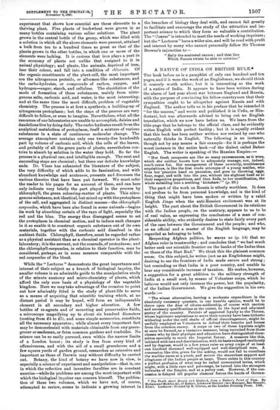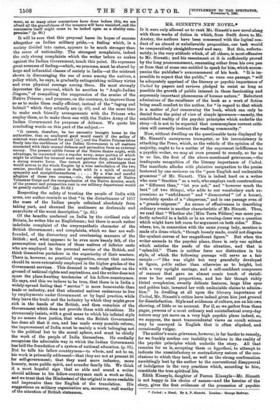A NATIVE OF INDIA ON BRITISH RULE.*
THE book before us is a pamphlet of only one hundred and ten pages, and if it were the work of an Englishman, we should think it scarcely worth notice ; but it is interesting as the work of a native of India. It appears to have been written during the alarm of last year about war between England and Russia, with the purpose of convincing his fellow-countrymen that their sympathies ought to be altogether against Russia and with England. The author tells us in his preface that he intended it
" for the masses," and wrote and published it in Urdu, or Hin- dostani, but was afterwards advised to bring out an English translation, which we now have before us. We learn from the title-page that he belongs to the official class, and he evidently writes English with perfect facility ; but it is equally evident that this book has been neither written nor revised by one who naturally thinks in English. The following is an instance, though not by any means a fair example—for it is perhaps the worst instance in the entire book—of the dialect called Baboo English. The writer is speaking of the Russian Empire :—
" Her fresh conquests are like so many excrescences, as it were, which she neither knows how to adequately manage, nor, indeed, much cares for. Her management of these unwieldy, troublesome acquisitions, is like the first crude attempts of a young maiden, who tries her 'prentice hand on pancakes, and goes on throwing eggs, flour, sugar, and milk into the pan, without the slightest heed as to their respective proportions, and then finds, to her mortification, the whole subsiding into a seething kickshaw.' " (p. 29.)
The part of the work on Russia is utterly worthless. It does not profess to be from personal knowledge, and is the kind of thing that might have been spoken or written by a rabid English Jingo when the anti-Russian excitement was at its height. The part about the British Government in its relations with the Indian people, on the contrary, appears to us to be of real value, as expressing the conclusions of a man of con- siderable ability, who evidently desires to state fairly every part of the case between the Government and the people; and who, as an official and a master of the English language, may be regarded as belonging to both.
Respecting Afghan politics, he warns us (p. 51) that no Afghan ruler is trustworthy ; and concludes that " we had much better seek our scientific frontier on the banks of the Indus than on those of the Hari Rud." We think this the plainest common sense. On this subject, he writes just as an Englishman might, desiring to see the frontiers of India made secure and strong ; but reminding us that India is a poor country, and unable to bear any considerable increase of taxation. He makes, however, a suggestion for a great addition to the military strength of India at a small cost, by means of Volunteer corps, which he believes would not only increase the power, but the popularity, of the Indian Government. We give the suggestion in his own words :-
" The wisest alternative, barring a moderate expenditure in the absolutely necessary quarters, in our humble opinion, would be to throw open the door of citizen-soldiership, of course with caution and necessary qualifications at the outset, to the loyal and educated gentry of the country. I'atrioty of approved loyalty to the Throne, whose legitimate aspirations to serve their country have been hitherto withering under the cold shade of official discouragement, might be usefully employed as Volunteers to defend their hearths and homes from the common enemy. A corps or two of these loyalists might at once be formed, as a tentative measure, being recruited from those classes who by their physique and education have distinguished them- selves specially to merit the Imperial favour. A measure like this, initiated with tact and discrimination, with its basis enlarged cautiously and by degrees, would in a few years raise an army corps of at least one hundred thousand well-equipped and well-disciplined men. A concession like this, given for the asking, would not fail to conciliate the warlike races at a pinch, and secure the staunchest support and allegiance of the Indian people at large. There exists in this country a perfect profusion of what may be called unreoruited levies, which might, with a little care and patronage, be turned into the strongest bulwarks of the Empire, and at a paltry oast. However, if the oon.. cession is delayed till popular clamour forces the bands of Govern- • The Truth about Ruesia ant England, from a Native's Point of Vino. Ii Muhammad Mohfuz Ali, of Kakori, Lucknow District ; late Manager, Raj Dingell, Kheri. Lucknow: Printed by R. Craven, at the London Printing Press. 1380. meet, ae so many other concessions have done before this, we are afraid all the gracefulness of the measure will have vanished, and the concession itself might come to be looked upon as a shabby com-
promise." (p. 60.)
It will be seen that this proposal bases its hopes of success altogether on Indian military pride,—a feeling which, in a society divided into castes, appears to be much stronger than the sense of nationality. The strongest complaints, indeed the only strong complaints which the writer before us makes against the Indian Government, touch this point. He expresses great soreness of feeling—which, we presume, must beahared by large and influential classes of society in India—at the mistrust shown in discouraging the use of arms among the natives, a policy which, he says, is gradually extinguishing military virtue and even physical courage among them. He most strongly deprecates the proposal, which he ascribes to "Anglo-Indian Jingoes," of compelling the suppression of the armies of the Native Princes ; and proposes, on the contrary, to improve them so as to make them really efficient, instead of the " tagrag and bobtail" which they actually are (p. 60), and at the same time to make such friendly arrangements with the Princes who employ them, as to make them one with the Native Army of the Indian Government for purposes of defence. We quote his concluding words on this part of the subject :—
" It cannot, therefore, be too earnestly brought home to the authorities, that an unalloyed good would result if the policy of mistrust were abandoned for good [sic], and the Native Princes taken freely into the confidence of the Indian Government in all matters connected with their mutual defence and protection from an external enemy. The present rabble forces of the Native States might, with advantage, be converted into a regular army, some portion of which might be utilised for internal work and garrison duty, and the rest as a strong reserve force. One cannot gainsay the advantages that would accrue to the whole Empire by a wise assimilation of the two armies, provided the matter is dealt with in a spirit of mutual sympathy and straightforwardness By a wise and careful adoption of these two courses,—viz., the organisation of Native Volunteer Corps and the reorganisation of the Native Armies, much of the present and prospective cost in our military department would be greatly curtailed." (pp. 61.62.)
Respecting the safety of trusting the people of India with arms, our author reminds us that "in the disturbances of 1857 the mass of the Indian people refrained absolutely from taking part, and shunned the mutineers as firebrands and anarchists of the worst description." (p. 63.)
Of the benefits conferred on India by the civilised rule of Britain, he writes like an Englishman; but there is much rather indefinite complaint of the unsympathetic character of the British Government ; and complaints, which we fear are well- founded, of the discourtesy and overbearing manners of the British ; and, what appears to be even more keenly felt, of the presumption and insolence of those natives of inferior caste who are employed in the personal service of the British, and think themselves partakers in the superiority of their masters. There is, however, no practical suggestion, except that natives should be more extensively employed in the higher grades of the Government services. This demand is made altogether on the ground of national rights and aspirations, and the writer does not spare the place-hunting tendencies of his fellow-countrymen. He says, and this we believe to be true, that there is in India a widely-spread feeling that " service " is more honourable than trade or industry, and that educated natives endeavour to live by employments under Government or by legal practice, while they leave the trade and the industry by which they might grow rich in the hands of the British, and then complain of the Government which does not provide them with situations. He strenuously insists, with a good sense to which his inflated style by no means does justice, that when the British Government has done all that it can, and has made every possible reform, the improvement of India must be mainly a work belonging not to the political but to the moral sphere, and must be chiefly the work of the people of India themselves. He cordially recognises the admirable way in which the Indian Government has laid the foundation of a system of national education. (p. 91). But he tells his fellow-countrymen—to whom, and not to us, his work is primarily addressed—that they are not at present fit for self!govemment; that they need more industry, more honesty, more public spirit, and sounder family life. We think it a most hopeful sign that so able and sound a writer should address to his fellow-countrymen such a work as this, and we trust that the Hindoetani of the original is more readable and impressive than the English of the translation. His suggestions on military organisation are, moreover, well worthy of the attention of British statesmen.















































 Previous page
Previous page